Tourism In Bhutan offers a unique journey into a land of ancient monasteries, breathtaking landscapes, and a profound commitment to Gross National Happiness. SIXT.VN is here to guide you through this enchanting kingdom, ensuring a seamless and enriching experience. Discover the unparalleled beauty and cultural richness of Bhutan, exploring sustainable travel options, and creating unforgettable memories.
1. Is Independent Travel Possible in Bhutan, or is a Tour Operator Necessary?
While independent travel in Bhutan is now possible, engaging a tour operator can significantly enhance your experience, especially for specialized activities. Bhutan has reduced its Sustainable Daily Fee (SDF) to US$100 (valid until August 2027) and no longer requires travelers to book all-inclusive tour packages.
Understanding Bhutan’s Tourism Policy
Bhutan’s tourism policy is designed to balance economic benefits with cultural and environmental preservation. According to the Bhutan Tourism Corporation Limited, this approach ensures that tourism contributes positively to the country’s Gross National Happiness.
Benefits of Using a Tour Operator
For activities like trekking, attending festivals, or pursuing specialized interests such as birding, horse trekking, or cycling, a tour operator is generally required and will enhance your overall experience. They provide logistical support, cultural insights, and ensure compliance with local regulations.
Independent Travel Options
Adventurous travelers can now independently book accommodations, guides (mandatory for travel beyond Thimphu and Paro), and transportation. You can also extend your visa while in the country and even drive your own car for a fee. SIXT.VN can assist with arranging these services to ensure a smooth and enjoyable trip.
How SIXT.VN Can Help
SIXT.VN offers tailored services to help you navigate Bhutan’s tourism landscape, whether you prefer independent exploration or a structured tour. Our expertise ensures you get the most out of your Bhutanese adventure.
2. Why is Travel Insurance Highly Recommended for Bhutan?
Travel insurance is highly recommended for Bhutan to cover unexpected medical expenses, trip cancellations, and other emergencies. Although proof of travel insurance is no longer required to apply for a Bhutanese visa, it is an essential safeguard for any overseas travel.
The Importance of Comprehensive Coverage
Ensure your travel insurance covers all the activities you plan to undertake in Bhutan, including trekking, cultural tours, and adventure sports. A comprehensive policy should include medical emergencies, evacuation, and repatriation.
Travel Insurance and Bhutan’s Remote Locations
Bhutan’s remote locations and mountainous terrain can make medical assistance challenging to access. Travel insurance ensures you can receive timely and appropriate care should an emergency arise.
SIXT.VN’s Recommendation
SIXT.VN strongly recommends that all travelers to Bhutan purchase comprehensive travel insurance. We can provide guidance on selecting the right policy to suit your needs and activities.
3. How Far in Advance Should I Book for Festivals and Trekking in Bhutan?
Book early for festivals and trekking in Bhutan, particularly for autumn and spring events, as these are popular times with limited availability. Locals believe Bhutan is wonderful to visit year-round.
The Best Times to Visit Bhutan
Consider timing your trip with autumn and spring, when the most famous tsechus (religious dance festivals) take place, and the leaves change color or the rhododendrons bloom, respectively. Summer and winter offer fewer crowds and unique experiences, though they may not be ideal for multiday treks.
Planning for Peak Seasons
If you’re considering attending a celebration or going trekking, book well in advance. Popular festivals like the Paro Tshechu and Thimphu Tshechu require reservations months in advance due to limited accommodations and permits.
Off-Season Travel
Summer and winter offer a chance to avoid the crowds, with plenty of lesser-known festivals. Winter, considered an auspicious time to travel, provides crowd-free visits with crisp air and clear skies, perfect for photography.
SIXT.VN’s Booking Assistance
SIXT.VN can assist you in planning your trip to Bhutan, ensuring you secure your spot at popular festivals and obtain the necessary permits for trekking. Our local expertise helps you make the most of your visit, regardless of the season.
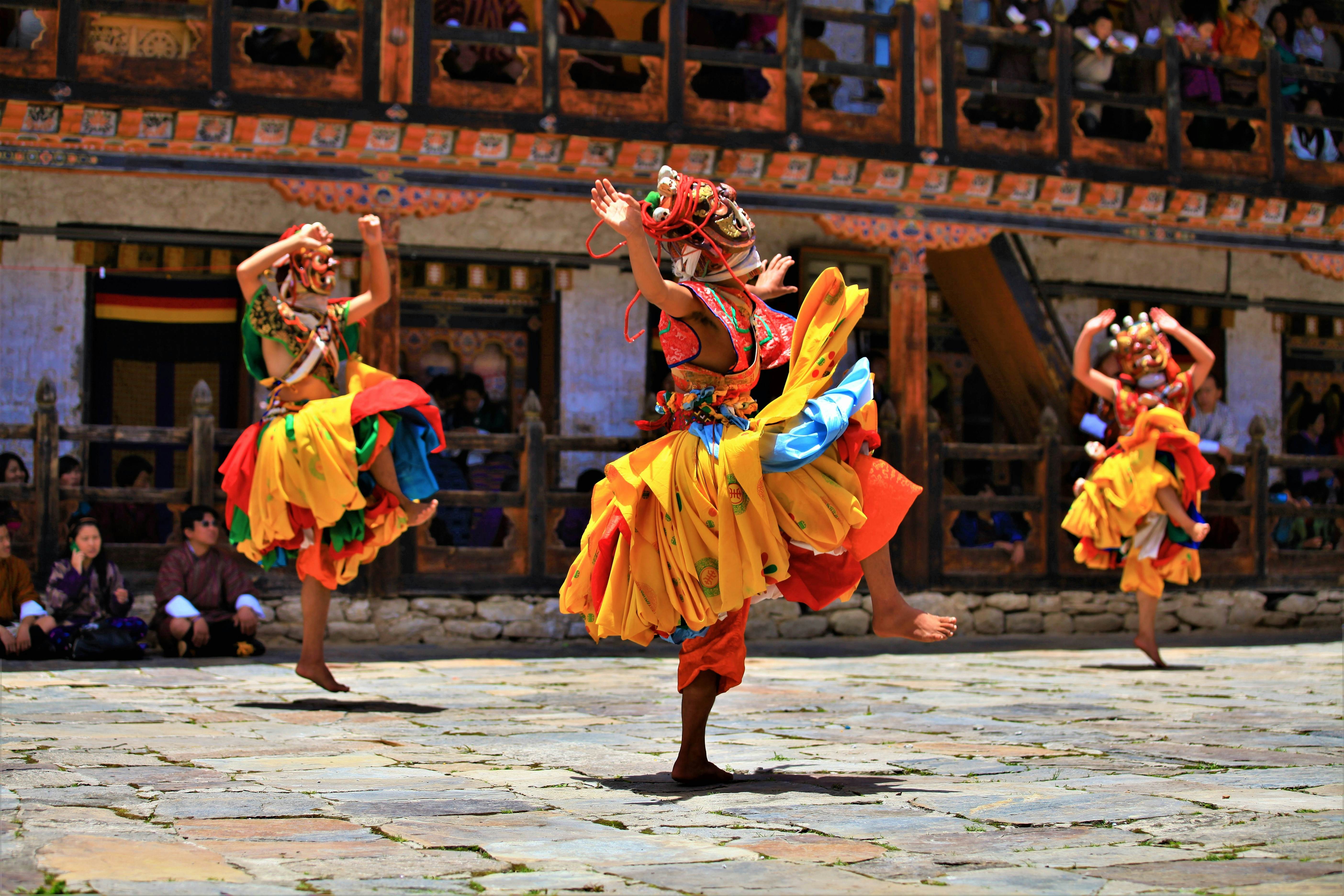 Monks in colorful costumes at a Bhutanese festival
Monks in colorful costumes at a Bhutanese festival
Booking Early is Essential
Early booking ensures you don’t miss out on key cultural events and trekking opportunities. SIXT.VN offers tailored services to help you navigate Bhutan’s tourism landscape, ensuring you secure your spot at popular festivals and obtain the necessary permits for trekking.
4. Which Airlines Fly to Bhutan and How Can I Get There?
Bhutan is served by two national airlines, Drukair and Bhutan Airlines, which operate flights to Paro International Airport. Because of the challenging landing conditions at Paro International Airport, surrounded by peaks as high as 5500m (18,000ft), only a select few pilots are authorized to fly there.
Flights to Paro International Airport
Direct flights to and from Paro connect you to various destinations, including Bangladesh (Dhaka), India (Bagdogra, Guwahati, Kolkata, and New Delhi), Nepal (Kathmandu), Singapore, Thailand (Bangkok), and the UAE (Sharjah).
Overland Travel to Bhutan
You can also reach Bhutan overland via India, but not China, owing to border disputes. The land border is accessible through Phuentsholing, the southern Bhutanese town bordering India.
SIXT.VN’s Travel Solutions
SIXT.VN can assist you in booking flights to Bhutan, ensuring you choose the most convenient route and airline. We also provide information on overland travel options and border crossing procedures.
5. How Does Bhutan Maintain Its Carbon-Negative Status?
Bhutan maintains its carbon-negative status through a constitutional mandate requiring a minimum of 60% forest coverage and a ban on plastic since 1999. Bhutan gained global attention for being the world’s first carbon-negative country.
Constitutional Mandate and Forest Coverage
Being roughly the same size as Switzerland with only 10% of its population, a key factor in sustaining this achievement is a landmark constitutional mandate requiring the country to maintain a minimum of 60% forest coverage at all times.
Environmental Policies and Practices
Bhutan’s commitment to environmental conservation is a key pillar of its Gross National Happiness (GNH) philosophy. The country has implemented various policies to minimize its carbon footprint and promote sustainable practices.
What Travelers Can Do
Travelers can contribute to Bhutan’s environmental efforts by minimizing their plastic use, respecting local conservation policies, and supporting eco-friendly tourism initiatives.
SIXT.VN’s Commitment to Sustainability
SIXT.VN supports sustainable tourism in Bhutan by promoting eco-friendly accommodations, responsible travel practices, and conservation awareness among travelers. We encourage our clients to respect and protect Bhutan’s natural environment.
6. How Safe is Bhutan for Travelers?
Bhutan is exceptionally safe, with a low crime rate and a welcoming environment for tourists. As a single woman, I never felt unsafe on any of my trips to Bhutan. I was also never truly “alone” since I was always under the watchful eye of my guide or local friends.
Low Crime Rate
Bhutan maintains a low crime rate, with violent crime being scarce. Travelers can explore the country with peace of mind, knowing they are in a safe and secure environment.
Safety Tips for Travelers
While Bhutan is generally safe, it’s always wise to take basic safety precautions, such as safeguarding your valuables, avoiding walking alone at night in poorly lit areas, and being mindful of your surroundings.
SIXT.VN’s Assurance
SIXT.VN prioritizes the safety and well-being of our clients. We provide reliable transportation, vetted accommodations, and knowledgeable guides who ensure your safety throughout your journey in Bhutan.
7. What Vaccinations Should I Have Before Traveling to Bhutan?
Stay current on your vaccinations and consult a health-care professional at least eight weeks before your departure to Bhutan. No vaccines are required for entry into Bhutan.
Recommended Vaccinations
Standard recommendations include vaccinations for hepatitis A and B, diphtheria, tetanus, and typhoid, in addition to childhood vaccinations for measles-mumps-rubella and polio. For longer trips, you may wish to consider vaccinations for Japanese encephalitis and rabies.
Rabies Awareness
Rabies is particularly noteworthy since friendly animals, like monkeys and dogs, can all transmit the virus, and untreated infection is fatal. If you are bitten by an animal, such as a stray dog, immediately go to the nearest health clinic and get a postexposure prophylaxis shot (you’ll need a total of four).
SIXT.VN’s Health Advice
SIXT.VN advises travelers to consult with their healthcare provider for personalized vaccination recommendations and health advice before traveling to Bhutan. We can also provide information on local healthcare facilities and emergency services.
8. How Can I Minimize Altitude Sickness in Bhutan?
Minimize altitude sickness by taking time to adjust to the high altitude and ascending slowly. Acute Mountain Sickness (AMS) can occur when travelers are above 2500m (8202ft). Given that the most commonly visited cities – Thimphu and Paro – are just 200m to 300m (656ft to 984ft) below that threshold, and that several treks in the Bhutanese Himalayas traverse mountain passes reaching heights of 5000m (16,404ft), AMS is a risk in Bhutan.
Strategies for Acclimatization
Ascend slowly, take rest days when needed, and if you begin to feel ill, stop. If it’s not managed carefully, AMS can develop into life-threatening forms of altitude sickness, so pay close attention to how you’re feeling. If your symptoms don’t ease, descend right away.
Planning Tip: Acclimatization
Due to the altitude, acclimatization may be necessary. It’s worth waiting a few days or until the end of your trip – saving the best for last! – before embarking on the iconic Tiger’s Nest Monastery trek, which ascends about 1000m (3000ft).
SIXT.VN’s Acclimatization Support
SIXT.VN can help you plan your itinerary to include acclimatization days and gradual ascents. We can also arrange for accommodations at lower altitudes initially to ease your transition.
9. What Medical Essentials Should I Pack for Bhutan?
Pack a few medical essentials, including insect repellent, sunscreen, and medications for altitude sickness and car sickness.
Essential Medical Supplies
Bring insect repellent to protect yourself from mosquito-borne illnesses when visiting in the summer months and in the southern regions. Because of climate change, Bhutan had its first nation-wide dengue epidemic in 2019. Dengue is deadly, and there is no vaccine to protect against it. The risk of contracting malaria in Bhutan is low.
Sun Protection
Bhutan’s average elevation is 3280m (10,760ft), making it one of the highest countries in the world. It also shares the same latitude as Texas, Egypt and the Bahamas, so the sun here is strong. Pack sunscreen and bring glasses to protect your eyes.
Other Useful Items
It’s also worth bringing Dramamine for car sickness and Diamox for altitude sickness – there are no tunnels in Bhutan and mountain roads are windy. If you need diapers or tampons, bring them with you. Menstrual pads are available in stores and at select hotels and restaurants. Earplugs are recommended too – you’ll need them at night when dogs start howling in downtown Thimphu.
SIXT.VN’s Packing Recommendations
SIXT.VN provides a comprehensive packing list to ensure you have all the necessary medical supplies for your trip to Bhutan. We can also arrange for the purchase of essential items upon your arrival.
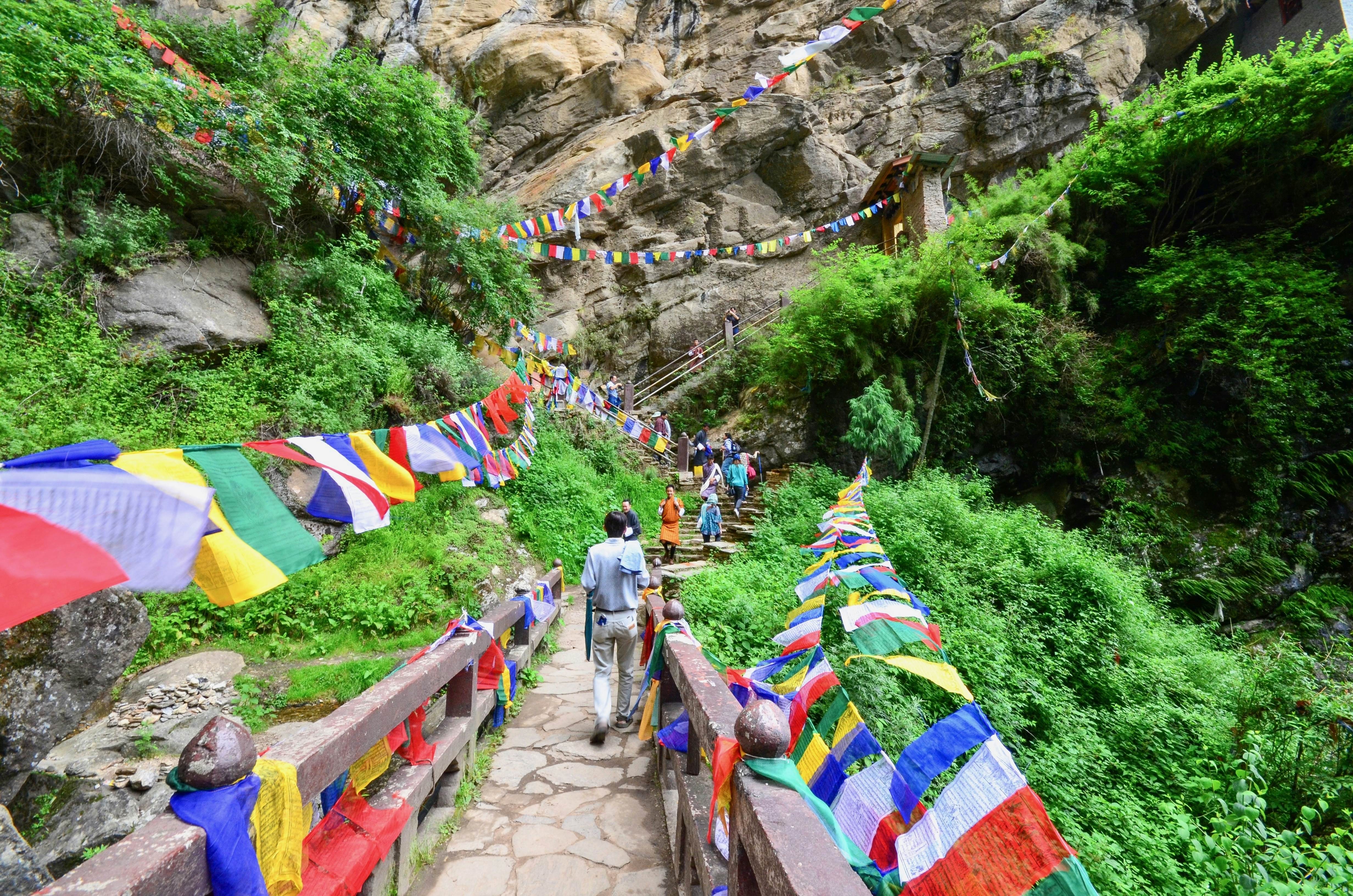 Prayer flags lining a path to Tiger's Nest Monastery
Prayer flags lining a path to Tiger's Nest Monastery
Acclimatize Properly
Acclimatize properly and bring necessary medical supplies to ensure a safe and enjoyable journey. SIXT.VN offers tailored services to help you navigate Bhutan’s tourism landscape and provides a comprehensive packing list to ensure you have all the necessary medical supplies for your trip to Bhutan.
10. What Kind of Health Care is Available in Bhutan?
Health care in Bhutan includes traditional remedies and Western medicine. Bhutan is sometimes called “Menjong,” which means “Land of Medicinal Herbs.”
Traditional Medicine
If you do find yourself feeling unwell during your trip, one option is a visit to Thimphu’s National Institute of Traditional Medicine. A member of staff will assess your pulse, temperature and ask about your bowels. In turn, you’ll receive a prescription for ayurvedic medicine crafted from local plants, all at no cost (a small donation is appreciated).
Modern Medicine
Alternatively, head to the nearest hospital or health clinic for treatment geared towards Western medicine. The Jigme Dorji Wangchuck National Referral Hospital, also known as the National Referral Hospital, in Thimphu is the biggest in Bhutan.
SIXT.VN’s Healthcare Support
SIXT.VN provides information on healthcare options in Bhutan, including traditional medicine centers and modern hospitals. We can also assist with arranging medical consultations and transportation to healthcare facilities.
11. What is Bhutanese Food Like?
Bhutanese food is spicy and delicious, with a focus on fresh and seasonal ingredients. For decades, Bhutanese cuisine suffered in reputation because travelers were mostly exposed to mediocre buffets at their three-star hotels, featuring Indian, Chinese and continental dishes tailored precisely to their palates.
Local Cuisine
Thankfully, those buffets are slowly being phased out. The local cuisine, emphasizing fresh and seasonal ingredients, is on the up and up and proving to be extremely tasty, if you know where to go. Ask your tour operator or guide for recommendations.
Must-Try Dishes
Bhutanese cuisine is defined by hot chili peppers, such as with ema datse (chilies with cheese) and kewa datse (potatoes, chilies and cheese). Dishes can be modified according to your taste if requested in advance.
SIXT.VN’s Culinary Recommendations
SIXT.VN offers culinary tours and recommendations to help you explore the best of Bhutanese cuisine. We can also arrange for special dietary needs and preferences.
12. Is it Safe to Drink Tap Water in Bhutan?
Don’t drink the tap water in Bhutan unless it has been boiled or purified. Tap water isn’t safe to drink in Bhutan unless it has been boiled or purified. Ask your hotel or guesthouse for boiled water, or purchase bottled water to have on your person.
Safe Drinking Options
Ask your hotel or guesthouse for boiled water, or purchase bottled water to have on your person. It is advisable to stick to bottled or boiled water to avoid any health issues.
Local Beverages
Do, however, drink the local whiskey and lager – Bhutan has a flourishing craft-beer scene.
SIXT.VN’s Hydration Advice
SIXT.VN ensures that safe drinking water is readily available during your travels in Bhutan. We provide bottled water on our tours and can recommend reputable sources for purchasing water.
13. What Local Etiquette Should I Follow in Bhutan?
Follow local etiquette in Bhutan, including using respectful greetings and gestures, and being mindful of cultural customs.
Basic Greetings and Phrases
“Kuzu zangpo la” means “hello” in Dzongkha, a Sino-Tibetan language and the national language of Bhutan, most commonly spoken in the western part of the country. Recite this while bowing (shaking hands is less common). The deeper the bow, the greater the respect.
Language and Communication
Aside from Dzongkha (and the many other local languages and dialects), English is widely spoken because it is the language of instruction in schools. When Bhutanese converse in English, it is common to hear the word “la” at the end of a sentence or question as a sign of respect; for example, “Thank you, la.” Feel free to reciprocate.
Dining Etiquette
If you find yourself invited into someone’s home and offered food, tradition dictates that you say the words “meshu meshu” while covering your mouth with your hands. After two or three offers, it is customary to accept. Similarly, if you are the one making an offer, or even giving a gift or tip, expect similar resistance. (Do consider giving a small tip if someone has invited you into their home and served you food or arra, a local spirit distilled from rice.)
SIXT.VN’s Cultural Guidance
SIXT.VN provides comprehensive cultural briefings to help you understand and respect Bhutanese customs and traditions. Our guides ensure you are well-informed and prepared to interact respectfully with local communities.
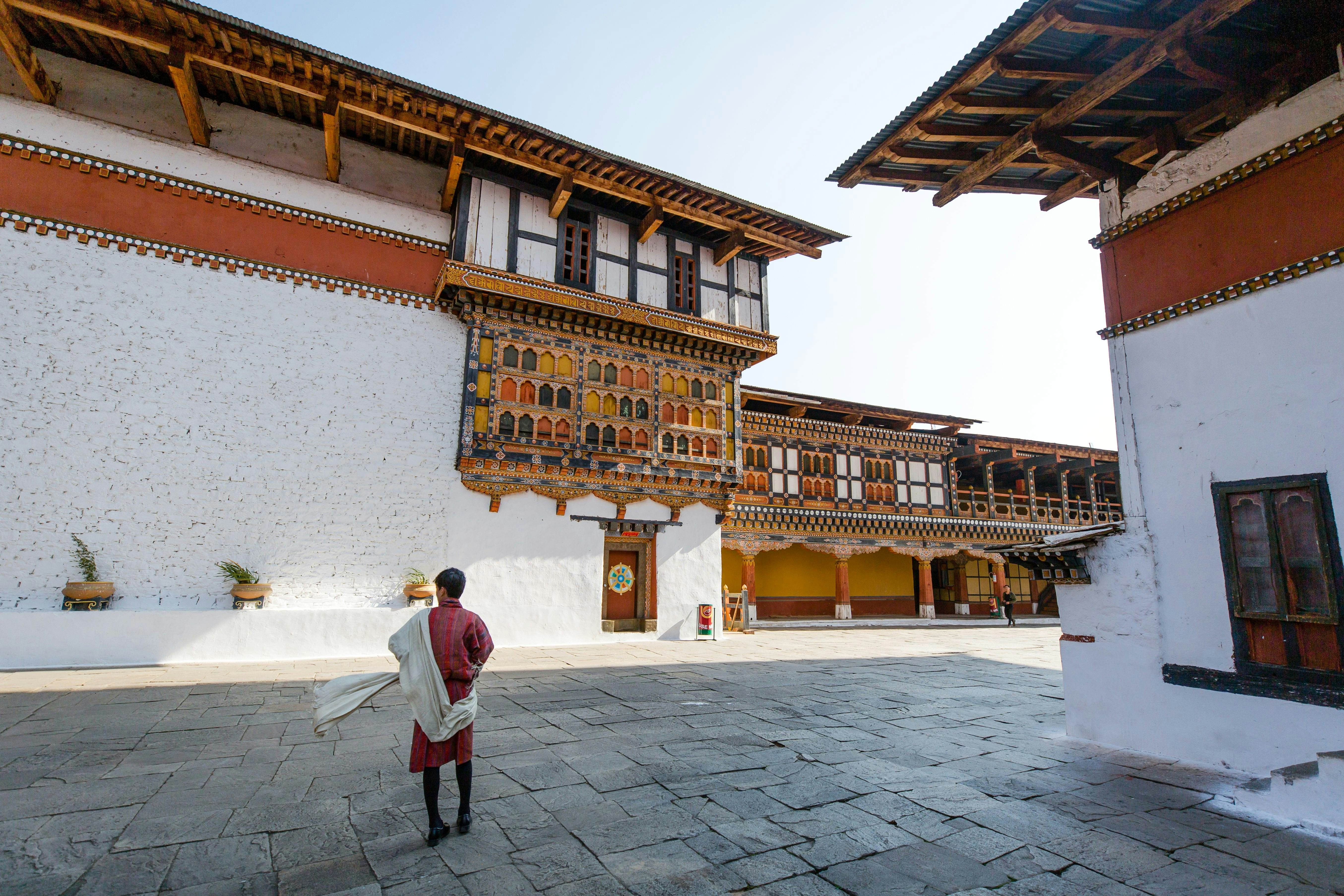 A guide in traditional Bhutanese dress
A guide in traditional Bhutanese dress
Show Respect
Show respect for local customs and traditions to enhance your travel experience. SIXT.VN can provide additional insights into Bhutanese culture, enhancing your understanding and appreciation of this unique country.
14. Is Tipping Customary in Bhutan?
Tipping is appreciated in Bhutan but not mandatory, especially for guides and drivers. Even if you’ve paid in advance for your all-inclusive trip, show appreciation to your guide and driver by tipping them at the end. On a trek, extend this gesture to the crew – ie the cook and any helpers.
Tipping Guidelines
While 10–15% is normal, the amount and currency are up to you. Tipping is not necessary at restaurants and hotels. A 10% service charge is already added to your bill when you dine out.
SIXT.VN’s Tipping Advice
SIXT.VN provides guidelines on tipping etiquette in Bhutan, ensuring you show appropriate appreciation for services rendered. Our guides can offer additional advice based on local customs.
15. What is Nightlife Like in Thimphu?
Head to Thimphu for Bhutan’s nightlife, which offers a mix of bars, music venues, and nightclubs. While most people are drawn to Bhutan for its serene landscapes, peaceful Buddhist monasteries and imposing fortresses (dzongs) such as Punakha Dzong, the country is hiding a buzzing nightlife and music scene equally worth exploring.
Nightlife Options
Thimphu’s nightlife centers around Chang Lam near the stadium, featuring diverse options like the Zone (a popular bar), Mojo Park (a fantastic music venue, where the band Misty Terrace got its start), the Grey Area (Bhutan’s first gastropub) and nightclubs Space 34 and Vivacity, which are open to the wee hours.
SIXT.VN’s Nightlife Recommendations
SIXT.VN can recommend safe and enjoyable nightlife options in Thimphu. Our local expertise ensures you experience the best of Bhutan’s entertainment scene while adhering to local customs.
16. What are the Rules Regarding Smoking and Cannabis in Bhutan?
It is legal to smoke in Bhutan, but be discreet. Bhutan was long known for its drastic yet visionary health law that forbade smoking and the trade of tobacco products.
Smoking Regulations
While the law was reversed in 2021, smoking must be done “out of sight,” ie behind buildings. The same goes for vaping. Vaping products are sold in a few places in Thimphu, but they’re not widely available.
Cannabis Laws
Despite cannabis growing prolifically throughout the country, it remains illegal. Possession can land you in jail for up to one year. The only “drugs” produced in the country are traditional medicines.
SIXT.VN’s Legal Advice
SIXT.VN provides up-to-date information on Bhutanese laws and regulations, ensuring you are aware of the legal guidelines regarding smoking and cannabis. We advise all travelers to respect and adhere to local laws.
17. How Should I Approach Local Beliefs in Bhutan?
Keep an open mind about local beliefs in Bhutan, as folktales, myths, and legends are an integral part of the culture.
Cultural Sensitivity
Whether it’s migoi (yeti) sightings in Bhutan’s wild east, the significance of phalluses as symbols of protection or the flying tiger bringing Guru Rinpoche to the cave where the gravity-defying Tiger’s Nest Monastery now stands, folktales, myths and legends are an integral part of Bhutan’s culture and national pride – and believed to be true.
Suspending Preconceptions
Approach Bhutan with an open mind. Travelers from the Global North may find it challenging to suspend logic and reason, but be kind when pushing back, and consider setting aside your preconceptions.
SIXT.VN’s Cultural Insights
SIXT.VN offers cultural immersion experiences to help you understand and appreciate Bhutanese beliefs and traditions. Our guides provide context and insights into local customs, fostering a deeper connection with the culture.
18. What Should I Pack for a Trip to Bhutan?
Pack layers, modest clothes, and good boots for varying temperatures and terrains in Bhutan. You’ll want layers for fluctuating temperatures and varying terrains, and modest clothing for entering temples and monasteries, including socks for cold temple floors.
Clothing Recommendations
Aside from a good pair of hiking boots, bring a nicer shoe to wear with a gho or kira (Bhutanese national dress for men and women, respectively), should you decide to buy an outfit – highly recommended if you’re attending a festival or meeting with a dignitary.
Inspiration
For inspiration, follow Bhutan Street Fashion on Instagram.
SIXT.VN’s Packing List
SIXT.VN provides a detailed packing list to ensure you are well-prepared for your trip to Bhutan. We offer recommendations on clothing, footwear, and accessories suitable for the climate and activities.
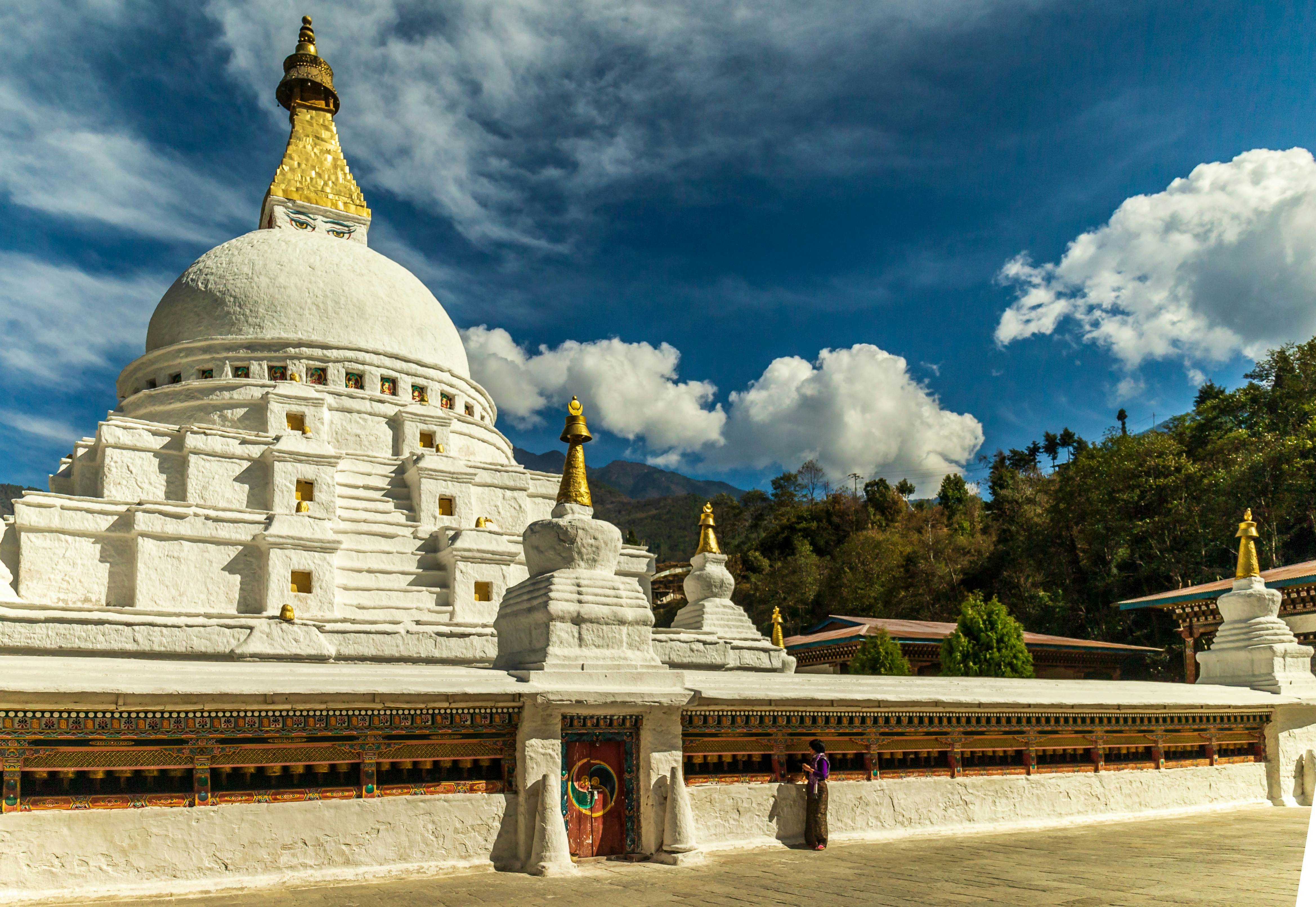 A white chorten with a gold top
A white chorten with a gold top
Pack Appropriately
Pack appropriately and respect local customs to enhance your travel experience. SIXT.VN offers comprehensive guidance to ensure you are well-prepared for your journey to Bhutan.
19. What are the Best Ways to Manage Money in Bhutan?
Carry cash and download money apps for convenient transactions in Bhutan. It’s easier to bring your own money (make sure the bills are crisp) rather than rely on and seek out ATM machines in the country.
Currency and Exchange
The official currency in Bhutan is the ngultrum, which is pegged 1:1 to the Indian rupee. Exchange at a bank or hotel so that you have small ngultrum notes for butter-lamp offerings, donations at religious sites, buying souvenirs, and tipping your guide, driver and trekking crew. Plus, you’ll need small bills for entrance fees.
Digital Payment Options
Most Bhutanese businesses accept cash or payments through either goBoB or the BNB MyPay apps. Foreign visitors can activate the app by downloading it from Google Play or Apple’s App Store, inserting a local SIM purchased at the airport and funding the digital wallet with their credit or debit card.
Choosing the Right App
While goBoB is more popular among locals, some tour operators argue MyPay is better for foreigners because it is linked to more international card networks and is powered by Stripe.
SIXT.VN’s Financial Advice
SIXT.VN provides advice on managing your finances in Bhutan, including currency exchange tips and recommendations for using digital payment apps. We ensure you have access to reliable and convenient payment options.
20. Should I Get a SIM Card Upon Arrival in Bhutan?
Pick up a SIM card on arrival in Bhutan for easy access to local mobile networks and internet services. SIM cards used to be challenging to obtain, but now you can easily get them upon arrival at Paro International Airport.
Pocket Wi-Fi
You can also rent a pocket wi-fi device there – useful if you’re planning to visit remote regions and need to be online.
SIXT.VN’s Connectivity Solutions
SIXT.VN assists you in obtaining a local SIM card upon arrival in Bhutan, ensuring you stay connected throughout your trip. We also offer information on pocket Wi-Fi rental options for remote areas.
21. What is the Etiquette at Religious Sites in Bhutan?
Understand the etiquette at religious sites in Bhutan, including removing shoes and hats, and respecting sacred traditions.
Proper Conduct
When visiting Buddhist monasteries, nunneries, and temples, observe proper etiquette: remove shoes and hats, wear clothing that covers your shoulders and knees, refrain from photography in altar rooms, avoid pointing, never lean against a stupa and consider leaving a small donation on the altar or with a monk. If seeking a blessing, it’s customary to offer a small donation.
Circumambulation
Be it in a car or on foot, circumambulation of a Buddhist temple or shrine, such as a stupa or chorten, must always be clockwise. To go counterclockwise, whether it’s out of ignorance or on purpose, is seen as offensive, culturally insensitive and unlucky.
Prayer Wheels
Similarly, prayer wheels, which help purify karma, should be spun in a clockwise direction.
SIXT.VN’s Cultural Guidance
SIXT.VN provides comprehensive cultural briefings to ensure you understand and respect the etiquette at religious sites in Bhutan. Our guides offer insights into the significance of various traditions and practices.
22. Is Bargaining Acceptable in Bhutan?
Don’t bargain hard in Bhutan, as aggressive negotiating tactics are not common. Unlike some other places in Asia where you’re expected to haggle, Bhutan’s market scene is a lot more straightforward. You typically pay the price that’s listed – aggressive negotiating tactics are a foreign concept.
Shopping Expectations
That said, be prepared to spend a pretty penny if you plan to shop. You’ll be drawn to abundantly colorful textiles crafted from natural fibers, like silk and cotton. These can take months to produce, so prices reflect the meticulous work and cultural richness woven into each piece, often by women.
Budget-Friendly Options
Geometric yathras, textiles made of yak wool and commonly found in central Bhutan’s Bumthang region, are a budget-friendly option.
SIXT.VN’s Shopping Tips
SIXT.VN offers shopping tips and recommendations to help you find unique and authentic souvenirs in Bhutan. We advise respecting local pricing customs and supporting local artisans.
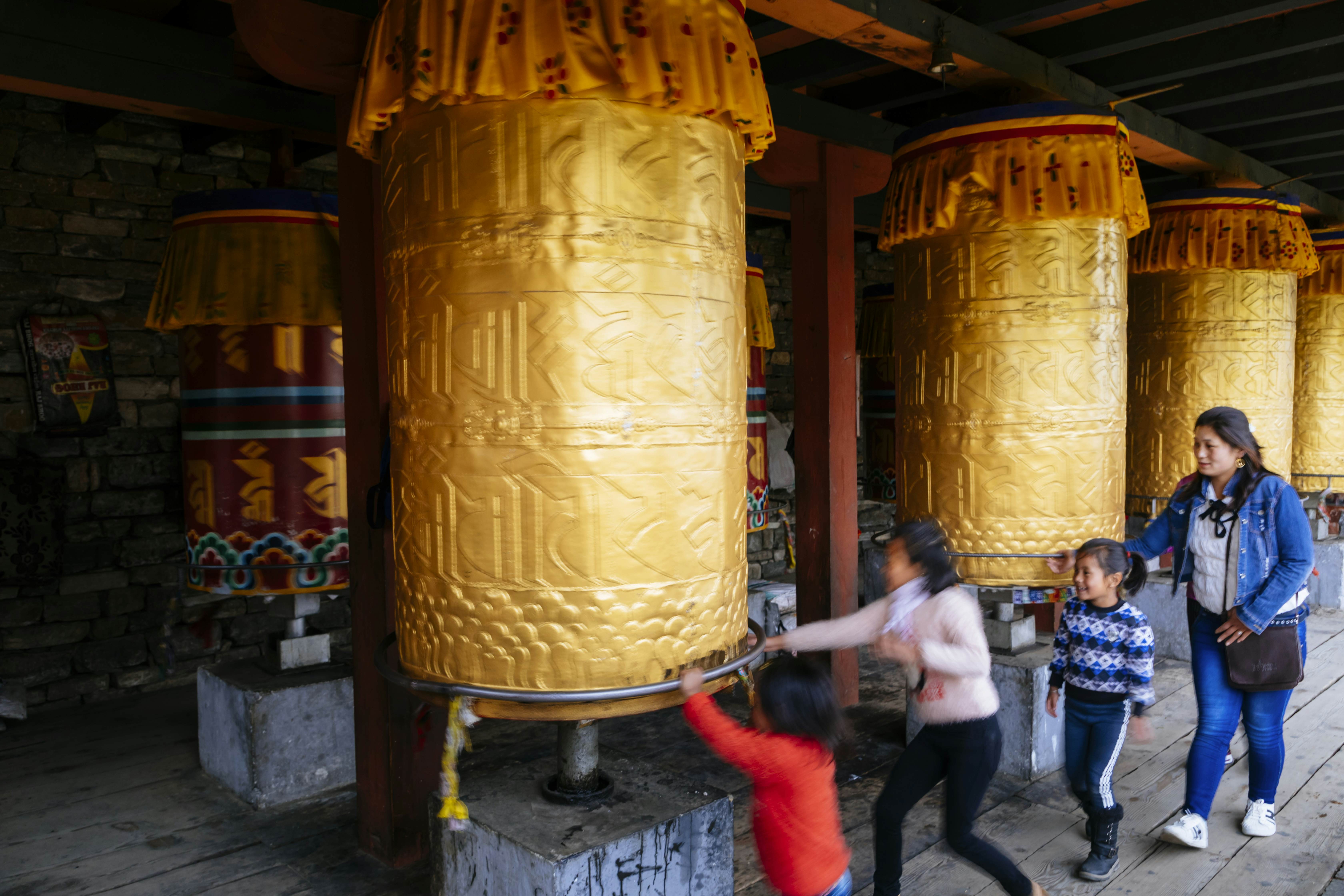 A woman spinning a prayer wheel in Bhutan
A woman spinning a prayer wheel in Bhutan
Respect Traditions
Respect traditions and customs to ensure a positive travel experience. SIXT.VN ensures you are well-informed and prepared to interact respectfully with local communities.
23. How Can I Stay Updated on Festival Dates in Bhutan?
Consult the lunar calendar to stay updated on festival dates in Bhutan. Since Bhutan follows the lunar calendar, dates for Buddhist festivals, like tsechus, change from year to year.
Cultural Festivals
However, some cultural festivals, like Bhutan National Day and the Black Necked Crane Festival in Phobjikha Valley, follow the Gregorian calendar and therefore stay the same.
SIXT.VN’s Festival Calendar
SIXT.VN provides a regularly updated festival calendar to help you plan your trip around Bhutan’s cultural events. We ensure you have the latest information on festival dates and locations.
Ready to Experience the Magic of Bhutan?
Don’t let the challenges of planning a trip to Bhutan hold you back. SIXT.VN offers comprehensive services including personalized itinerary planning, airport transfers, hotel bookings, guided tours, and more. Let us handle the details so you can focus on creating unforgettable memories in this enchanting kingdom.
Contact SIXT.VN Today!
- Address: 260 Cau Giay, Hanoi, Vietnam
- Hotline/WhatsApp: +84 986 244 358
- Website: SIXT.VN
FAQ About Tourism in Bhutan
1. What is the best time to visit Bhutan?
The best times to visit Bhutan are during the spring (March to May) and autumn (September to November) when the weather is pleasant, and many festivals take place.
2. Do I need a visa to visit Bhutan?
Yes, all foreign nationals except Indian, Bangladeshi, and Maldivian citizens require a visa to visit Bhutan. SIXT.VN can assist with the visa application process.
3. What is the Sustainable Development Fee (SDF) for Bhutan?
The Sustainable Development Fee (SDF) is US$100 per night per person, valid until August 2027. This fee supports Bhutan’s sustainable tourism initiatives.
4. Can I travel independently in Bhutan?
While independent travel is possible, it is mandatory to have a licensed Bhutanese tour guide for travel outside of Thimphu and Paro.
5. What should I wear when visiting temples in Bhutan?
When visiting temples, dress modestly, covering your shoulders and knees. Remove your shoes and hats before entering the main prayer hall.
6. Is it safe to eat street food in Bhutan?
While street food options are limited, it is generally safe to eat at established restaurants and hotels. Ask your guide for recommendations.
7. What is the local currency in Bhutan?
The local currency in Bhutan is the Ngultrum (BTN), which is pegged to the Indian Rupee at a 1:1 ratio.
8. How can I stay connected to the internet in Bhutan?
You can purchase a local SIM card at Paro International Airport or rent a pocket Wi-Fi device. Many hotels and cafes also offer Wi-Fi.
9. What are some must-visit places in Bhutan?
Must-visit places in Bhutan include the Tiger’s Nest Monastery (Paro Taktsang), Punakha Dzong, Thimphu, and the Phobjikha Valley.
10. Are credit cards widely accepted in Bhutan?
Credit cards are accepted in larger hotels and shops in major towns, but it is advisable to carry cash for smaller establishments and rural areas.



